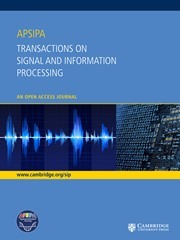-
- You have access: full
- Open access
- No longer published by Cambridge University Press
- ISSN: 2048-7703 (Online)
Asia-Pacific Signal and Information Processing Association (APSIPA) serves as an international forum for signal and information processing researchers across a broad spectrum of research, ranging from traditional modalities of signal processing to emerging areas where either (i) processing reaches higher semantic levels (e.g., from speech recognition to multimodal human behaviour recognition) or (ii) processing is meant to extract information from datasets that are not traditionally considered signals (e.g., mining of Internet or sensor information).
Cambridge University Press ceases publication of APSIPA Transactions on Signal and Information Processing on completion of Volume 10. From Volume 11 the Journal will be published by NOW Publishers. Please visit the new website at: https://www.nowpublishers.com/SIP
Cambridge University Press ceases publication of APSIPA Transactions on Signal and Information Processing on completion of Volume 10. From Volume 11 the Journal will be published by NOW Publishers. Please visit the new website at: https://www.nowpublishers.com/SIP
Latest articles
News
Themed Series: Multi-Disciplinary Dis/Misinformation Analysis and Countermeasures
- 19 May 2021,
- Themed Series of APSIPA Transactions on Signal and Information Processing on “Multi-Disciplinary Dis/Misinformation Analysis and Countermeasures”
Engineering « Cambridge Core Blog

-
Why pilots sometimes persist when it’s safer to stop
- 30 January 2026,
- The Aeronautical Journal February 2026 Vol 130 No 1344 Modern airline pilots operate in a highly proceduralised, wellregulated environment. It is often said that procedures are clear: if an approach is unstable, a go-around should be flown.…...

-
Turning boil-off hydrogen from a loss into a resource – a metal-hydride concept for future sustainable aviation
- 30 December 2025,
- Liquid hydrogen (LH2) is considered as a cornerstone of a low-carbon aviation future, yet the inevitable formation of hydrogen boil-off gas (BOG) is one of...

-
The Effectiveness of Using Virtual Reality Training Environments for Procedural Training in Fourth Generation Airliners
- 05 December 2025,
- If Virtual Reality (VR) can be such a game-changer in terms of the human experience of learning, then why don’t we see more of it on a daily basis? This was...

Tweets by CUP_SciEng